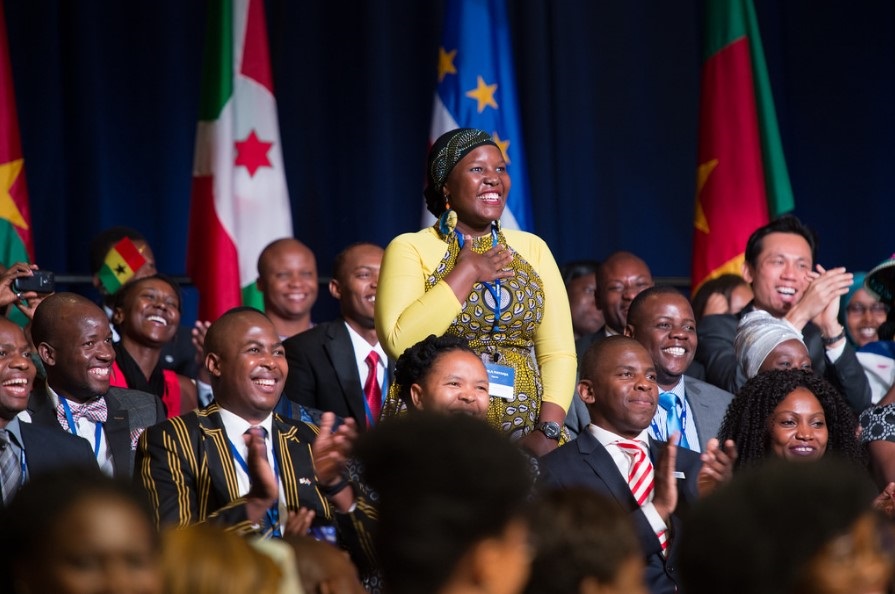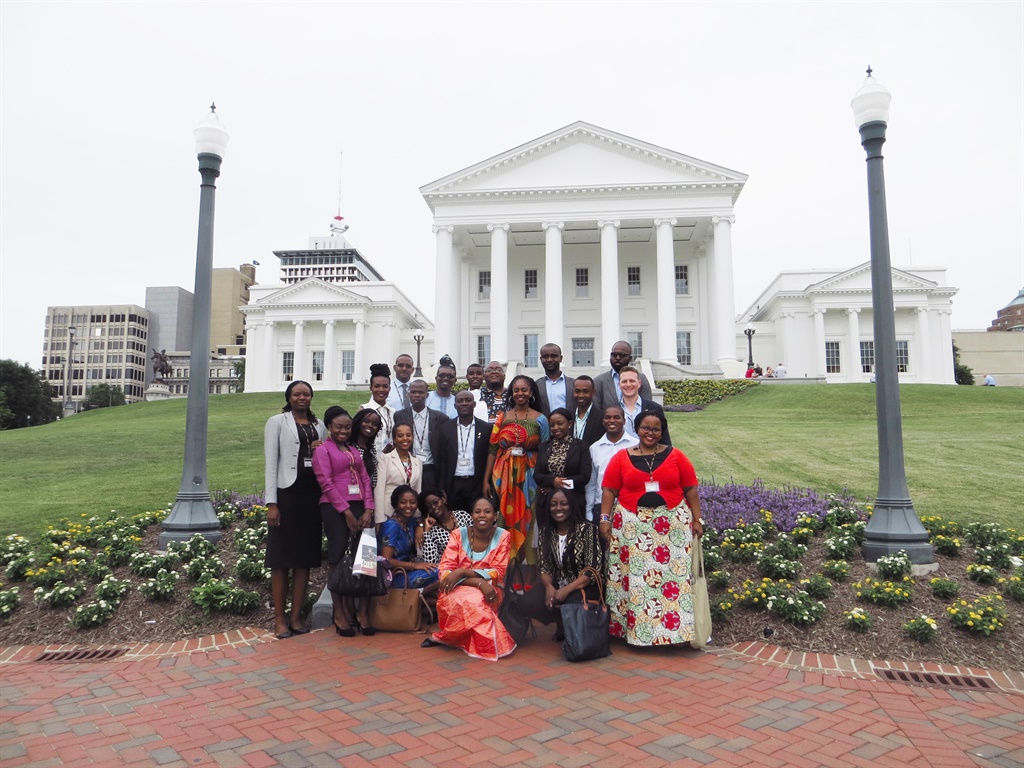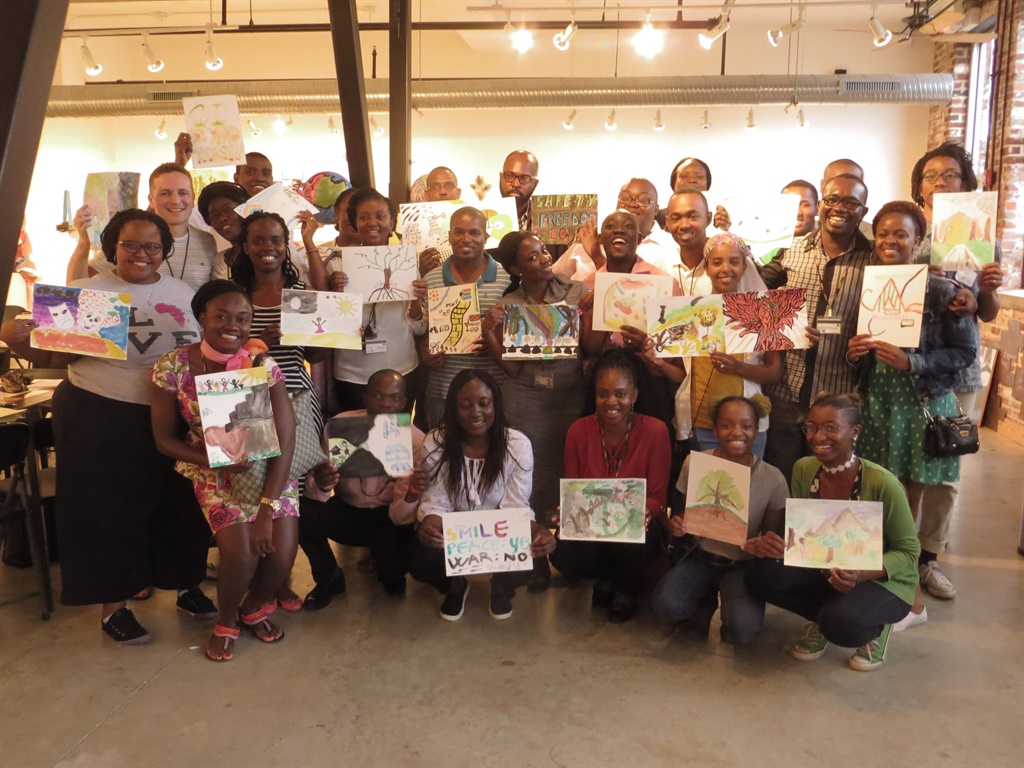
Mike Wilter was a Mandela Washington Fellow for 2016 – one of two whites in a group of 50 African fellows in the US. The group questioned him: Should he have qualified? Can whites identify as African? And what’s that about a husband? Here he explores how curiosity can be a foundation for conversations that drive change.
Conversations about building an inclusive society can be difficult. But with greater curiosity and compassion and less hand-wringing and vilification, these conversations can lead to a deeper understanding of the challenges facing South Africa and the opportunities available to us in this regard. From improving access to quality education and healthcare to growing the economy and addressing racism in all its forms, we need to find a constructive way to take our nation forward.
I recently had the privilege of joining 59 young South African leaders to participate in the Mandela Washington Fellowship in the US. Together with 940 young leaders from 48 African countries, we completed a six-week academic programme in public management, civic leadership or business and entrepreneurship at various universities across the US and came together for a leadership summit in Washington DC hosted by President Barack Obama. It was a once-in-a-lifetime experience that has fundamentally re-shaped the way I approach the difficult but necessary conversations that we are having back home in South Africa.
The formal programme offered valuable opportunities for professional development, but it was the informal conversations that I had with the other Fellows that ultimately offered me answers to some of the questions that have been running through my mind. In particular, I explored what is needed for different stakeholders or groups of people with different interests or ideas to come together, hear and understand each other and find workable solutions to the problems they face.
Two topics dominated the initial conversations that I had with other Fellows during the programme: my race and my sexual orientation. I had expected that these topics would come up in conversation and had decided from the outset to embrace them and see where the conversation went.
As one of two white Fellows in a group of 50 Fellows from a variety of African countries at Virginia Commonwealth University, it was not uncommon but somewhat amusing at the beginning of the programme to be mistaken by some Fellows for a university staff member, a shop attendant or the other white Fellow.
Once I indicated that I too was a Fellow, the conversation would sometimes shift gear and transition to questions like: As this Fellowship is for African leaders, can a white person claim to be African? Should white people be eligible for the Fellowship? Do I consider myself an African?
Another common and equally interesting interaction with some of the other Fellows was triggered by my wedding band.
On a number of occasions and prompted by the presence of my wedding band, I was asked about what my wife does and whether she is missing me while I am away from home. I would politely respond that I do not have a wife – to which one Fellow was quick to issue his condolences for the passing of my wife.
I would immediately dispel any assumptions that I was married to a woman or was a widower and made it clear that I was married to a man. At that point, the conversation would in some cases shift gear and focus on questions like: If you are gay, are you into cross-dressing or bestiality? Which one of you is the man and which one of you is the woman? Am I or my husband transitioning at the moment? Is paedophilia common in the gay community? Is your marriage actually a real marriage?
At times, these were difficult questions that initially made me feel naked, out of place and vulnerable but ultimately they were questions I was willing to explore. I was curious to know whether these questions could sow seeds of unity rather than division during the course of the programme. I wanted to learn from these conversations, so I let the questions lead the conversation.
Never backed by threats of violence or harm and always infused with some degree of compassion, these questions were ultimately motivated by a hunger to know more, to understand the world better. They were questions that did not need to be feared.
The mutual risk of offence was always there. But these questions presented us with opportunities for mutual sharing and learning if we approached them with curiosity, honesty, patience and kindness.
If some of the Fellows were comfortable or courageous enough to show curiosity in this way, it felt only natural for me to offer the same in return. It didn’t seem necessary or appropriate to react defensively. Nor did it seem right to impulsively brand these questions or the people asking them as racist, homophobic or simply discriminatory without exploring further.
Avoiding these conversations altogether would have limited the potential for personal reflection and stunted opportunities for relationship building.
Instead, we asked each other more questions and shared our respective experiences and ideas on each topic. Not necessarily with the intention of adopting the same view but rather with a desire to achieving a greater understanding of each other (and ourselves). In turn, this sometimes led to shifts in our thinking.
Exchanging our questions and answers on these and other challenging topics with a childlike curiosity became a thrilling experience. If a question or an answer landed abruptly or insensitively or was open to an offensive interpretation, judgment was suspended, patience was exercised and space was made for clarification.
Most conversations were marked by a deep respect for the experiences of others. We expressed ourselves freely and spoke for ourselves, not for others. We were challenged when it appeared that we may be relying on flimsy assumptions or generalisations. But always with compassion and respect.
Nobody in these conversations appeared to be in the business of making others feel comfortable in their own ignorance. Ultimately, these interactions offered opportunities for sharing and learning for those open to doing so.
The more inquisitive we were in conversation with each other and the more we gave each other the space to share our knowledge and experiences, the better placed we were to listen actively and with purpose to each other. In turn, we became more comfortable with being vulnerable in conversation with each other. We became more open to a broader range of ideas and to connecting with each other. And ultimately we were better placed to find a way to take our discussions forward. Together, we had created spaces where conversations that drive change were possible.
When practised authentically, compassionately and with a healthy awareness of one’s own position in the world, curiosity can be a powerful tool in the pursuit of progress.
I recall saying a heartfelt farewell on the final day of the presidential summit in Washington DC to a few of the Fellows with whom I had had courageous conversations on a variety of topics. Fellows from Kenya, Tanzania, Zimbabwe, Mauritius, Djibouti, Zambia, Namibia, Seychelles and the Democratic Republic of Congo, to name a few. We reflected on our discussions and acknowledged we had learnt a lot from each other. We agreed that the many conversations we had shared on a range of topics had re-shaped how we intended to approach those topics in our respective countries.
The robust but measured and progressive nature of the conversations we shared, combined with the nuanced learning achieved by embracing these conversations, has inspired and challenged me to think differently about the way in which we approach some of the obstacles standing in South Africa’s way today. What could we learn and achieve together if we were to approach the issues that can and often do divide our communities with curiosity?
I have begun applying this approach to some of the conversations that I have been having with friends, family and colleagues and am starting to see its benefits. From conversations focused on understanding and addressing all forms of racism in the spaces where we live and work to discussions on the urgent need for inclusive school policies and expanding access to quality higher education (among other topics), I have a better sense than before of where and how I am located in my community, my country and my continent. I have a deeper appreciation of the challenges facing and opportunities available to South Africa specifically and Africa more generally. I have a stronger sense of who I am and a greater appreciation of the privileges I enjoy. And I have a clearer perspective of how I can do more with what I have and what I know to build a more inclusive South Africa from where I stand. This experience has taught me how important it is to actively create space within a conversation for all views to be heard and understood, even if some of those views do not align to your own.
There are risks that come with choosing to participate in conversations focused on building an inclusive society.
Feeling misunderstood, failing to demonstrate understanding and prejudging the motives of others. Appropriating or misunderstanding the experiences of others, listening selectively, coming across as arrogant, hurting others or being hurt. And it is these risks that deter some people from engaging meaningfully with the issues.
Some people care deeply about these issues but choose not participate in the conversation out of fear of being misunderstood and vilified. Others have the privilege of being able to retreat to their comfort zone and at most express outrage at and reject what may be happening outside of that comfort zone. While disengaging may help avoid difficult conversations, it certainly does not help efforts to find workable solutions to the issues that divide South Africans. And that surely contributes to the problems we face and blocks the opportunities for progress available to us.
A difficult conversation that I had with another Fellow from South Africa comes to mind. Both driven by a strong sense of justice, he and I had spent many hours discussing and sharing our ideas about South Africa, its past, its present and its future. We had a connection from day one of the Fellowship and both seemed excited by the friendship we were developing. At one stage during our time in the US, we were discussing whether the remarks of a white staff member at our university were racist. When I expressed my view that the staff member’s remarks were racist and motivated why I thought this, my fellow South African appeared suspicious of my motivations for holding this view. He questioned whether my views were motivated by a need or desire to manage my white guilt.
I was gutted. Consumed by anxiety and feeling misunderstood, it was the perfect moment for me to practise curiosity. Instead, I became distant and committed to “letting it go”, “taking the hit” and “moving past” the question.
The more I tried to “move on” the more aloof and disinterested I appeared to my fellow South African. My strategy was not helpful to me or to our friendship. It was at this point that we realised just how important it was for us – a black South African and a white South African – to talk this through, to ask more questions, to find greater understanding. Once we started to practise curiosity in conversation with each other, we both acknowledged that, while it is possible for a white person to identify and genuinely be outraged by racism, there still exists an inherent trust deficit between different race groups in South Africa. We committed to continuing this discussion in this vein.
In my experience, practising curiosity in these conversations can prevent or reduce the possibility of these risks from materialising.
Curiosity in this sense is in every question you ask. It is enquiring and open to any answer that may come. It is full of fascination and compassion. It is fearless, restless and unthreatening. It feels sincere and honest. It is playful and inclusive in its pursuit for knowledge. It is increasingly comforting and rewarding with each new insight and understanding that it brings. It operates in good faith and is self-motivating. Its only agenda is to facilitate learning and inspire change.
As the popular adage goes: “If you think education is expensive, try ignorance”.
» Mike Wilter is the Mandela Washington Fellow for 2016




 Publications
Publications
 Partners
Partners










